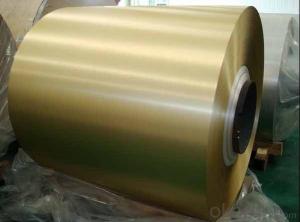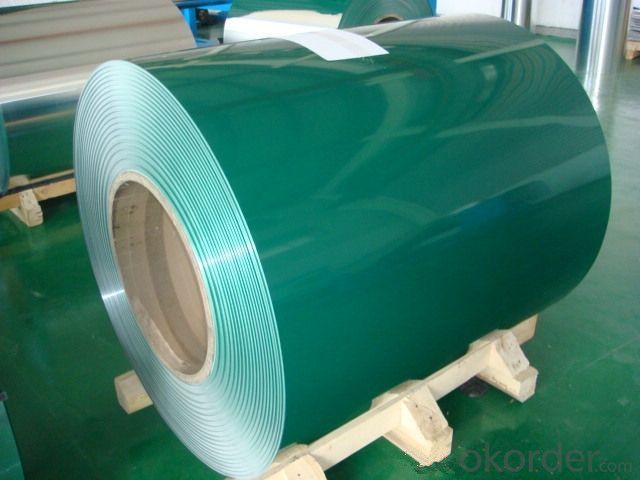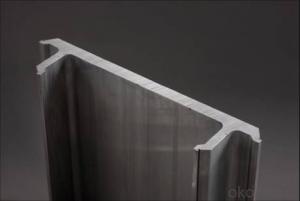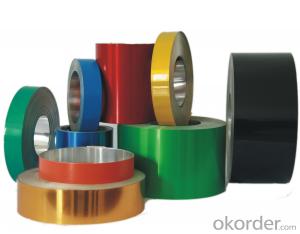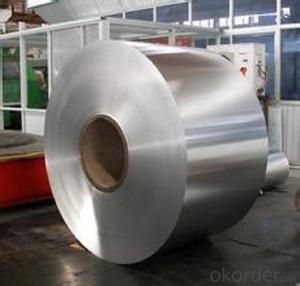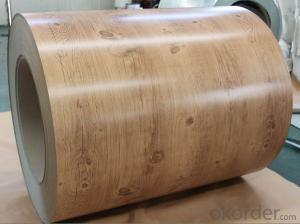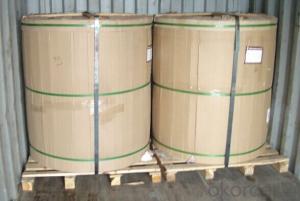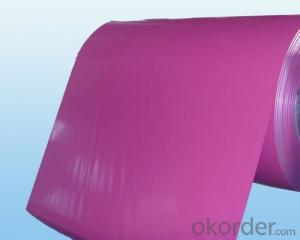Aluminum Coil Prices for Coated Aluminium Coil/Roll for Aluminium Shutters
- Loading Port:
- Shanghai
- Payment Terms:
- TT OR LC
- Min Order Qty:
- 2 m.t.
- Supply Capability:
- 60000 m.t./month
OKorder Service Pledge
OKorder Financial Service
You Might Also Like
Specification
Coated Aluminium Coil/Roll For Aluminium Shutters
Description
Alloy | 1060, 1100, 3003, 8011, etc. |
Temper | H16, H18, H24, H26, H28 |
Thickness | From 0.05mm to 3.0mm |
Width | Standard width:1240mm |
Special width:1300mm, 1520mm, 1570mm, 1595mm | |
Diameter | Standard dia:1200mm |
Interior dia:150mm,405mm,505mm | |
Weight | 2.5 T/coil,3.0 T/coil |
Coating | PE, PVDF, ACRYLIC |
Surface | Embossed, mill finish, coated |
Color | AS to code RAL |
Gloss | 10-90%(EN ISO-2813:1994) |
Coating Thickness | PE: more than 18 micron |
PVDF: more than 25 micron | |
Coating Hardness(pencil resistance) | More than 2h |
Coating adhesion | 5J (EN ISO-2409:1994) |
Impact Resistance | No peeling or cracking(50 kg/cm,ASTMD-2794:1993) |
Flexibility(T-bend) | 2T |
MEK resistance | More than 100 |
Advantage | 1.High temperature resistant 2.Weathering resistant 3.Scrubbing resistant 5.Acid or alkali proof 6. Fireproof 7.Light weight material is easy to construct and install |
Out package | Wooden splint with export standard |
Application | ACP, wall cladding, facades, roofs and canopies, ceilings, signboards, blind window, display platforms, electrical panels, etc |
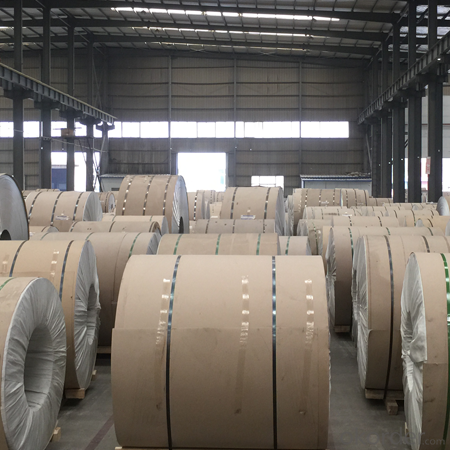
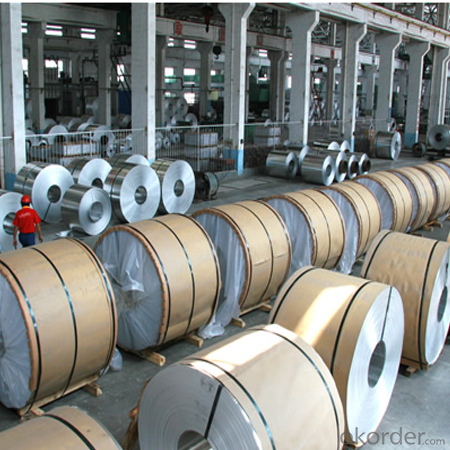
Manufacturing
Decoiler → Accumulator →Tension Leveler →Acid & Alkali Cleaner → Rinse →Conversion Treatment → Priming coater →Infrared Curing Oven →Main coater →Floatation Curing Oven →Strippable Film Applicator → Exit Accumulator → Recoiler
FAQ
--Q: Do you provide free samples?
--A: Yes, free samples will be sent to you on freight at destination.
--Q: Can I get your latest products catalogue?
--A: Yes, it will be sent to you in no time.
--Q: What is the MOQ?
--A: 2 tons
--Q: What are your payment terms?
--A: We accept L/C, T/T.
--Q: What kinds of alloy can you supply?
--A: 1000 series: 1050, 1060, 1070, 1100, 1145, 1200
3000 series: 3003, 3004, 3105, 3104
5000 series: 5052, 5083, 5754, 5182
6000 series: 6061, 6063, 6062, 6063
8000 series: 8011, 8021
--Q: What kinds of temper can you supply?
--A: O-H112: O,H12,H14,H16,H18,H22,H24,H26,H,32,H34,H111,H112
T3, T4, T6
- Q: Is aluminum veneer the same as color coated aluminum coil?
- In general, the molded product will be painted by special spraying factory according to customer’s needs. Color coated aluminum coil is more popular in ceiling.
- Q: Can aluminum coils be used for food processing conveyor systems?
- Yes, aluminum coils can be used for food processing conveyor systems. Aluminum is a durable and lightweight material that is resistant to corrosion, making it suitable for food processing environments. Additionally, aluminum is non-toxic and does not react with food, ensuring the safety and quality of the processed products.
- Q: Can aluminum coils be customized?
- Yes, aluminum coils can be customized according to specific requirements. Aluminum coils are highly versatile and can be customized in terms of thickness, width, length, alloy composition, surface finish, and other specifications. This allows for a wide range of applications in various industries such as construction, automotive, aerospace, electronics, and packaging. Customization of aluminum coils can be done through processes like slitting, cutting-to-length, embossing, painting, and coating. This flexibility in customization enables manufacturers to meet the unique needs of their customers and ensures that the aluminum coils are optimized for their intended use.
- Q: We are working on a new aluminum fixture. It is basically an aluminum spine with many 6061-T6 pins sticking out. Currently we drill the holes inside the spine and hammer the 5/32 6061-T6 pins inside. Is there anyway to cast aluminum with many 6061-T6 pins embedded (they will stick out after the casting)?
- Casting aluminum is one of the least expensive ways to make metallic objects and with a little clean up work and polishing, the results are stunning and shine like the wings of the old WWII bombers. Cast aluminum melts at a hot but relatively low temperature and is easy to carve after you cast it.
- Q: How are aluminum coils protected against galvanic corrosion?
- Aluminum coils are protected against galvanic corrosion through a combination of surface treatments and protective coatings. One common method is the application of a thin layer of anodization on the aluminum surface. Anodization involves electrolytically treating the aluminum with an acid solution, which creates a protective oxide layer on the surface. This oxide layer acts as a barrier, preventing the direct contact between the aluminum and other metals that may cause galvanic corrosion. Another method is the use of a protective coating, such as a polymer or paint, on the aluminum coils. These coatings provide a physical barrier between the aluminum and the environment, preventing the exposure of the metal to corrosive elements. The coatings are carefully selected to have good adhesion to the aluminum surface and excellent resistance to corrosion. In addition to surface treatments and coatings, proper design and material selection also play a crucial role in protecting aluminum coils against galvanic corrosion. By ensuring that dissimilar metals are not in direct contact and using compatible materials, the risk of galvanic corrosion can be minimized. This can be achieved through the use of isolation materials, such as gaskets or insulating tapes, to separate the aluminum coil from other metals in contact. Regular maintenance and cleaning also contribute to the protection against galvanic corrosion. It is important to remove any accumulated dirt, debris, or corrosive substances from the aluminum coils to prevent the formation of localized corrosion cells. Overall, a combination of surface treatments, protective coatings, proper design, and regular maintenance are essential in protecting aluminum coils against galvanic corrosion. These measures help to extend the lifespan and maintain the performance of the coils in various applications.
- Q: Are aluminum coils suitable for heat exchangers?
- Yes, aluminum coils are suitable for heat exchangers. Aluminum is a highly efficient and effective material for heat transfer due to its high thermal conductivity. It can quickly transfer heat from one medium to another, making it ideal for heat exchangers where efficient heat transfer is required. Additionally, aluminum coils are lightweight, corrosion-resistant, and have excellent durability, making them a popular choice for various applications, including heat exchangers. The corrosion resistance of aluminum ensures that the coils can withstand harsh environments and prevent the formation of rust or corrosion, prolonging the lifespan of the heat exchanger. Moreover, aluminum coils are easily moldable and can be formed into various shapes, allowing for flexibility in design and construction of heat exchangers. This versatility makes them suitable for a wide range of applications, including HVAC systems, refrigeration units, and automotive cooling systems. In summary, aluminum coils are well-suited for heat exchangers due to their high thermal conductivity, lightweight nature, corrosion resistance, durability, and versatility. These properties make aluminum coils an excellent choice for efficient heat transfer in various industries.
- Q: Are aluminum coils suitable for low-maintenance roofing applications?
- Indeed, low-maintenance roofing applications can benefit from the suitability of aluminum coils. Renowned for its durability, longevity, and corrosion resistance, aluminum proves to be an ideal roofing material. Despite its lightweight nature, aluminum coils possess remarkable strength that ensures superior structural integrity, enabling them to endure diverse weather conditions. Moreover, aluminum's low-maintenance characteristics make it a standout choice. It does not rust and does not necessitate regular painting, allowing homeowners and building managers to save valuable time and money that would otherwise be spent on maintenance tasks such as repainting or replacing rusted components. Ultimately, aluminum coils serve as an outstanding option for low-maintenance roofing applications.
- Q: What are the different coil handling methods for aluminum coils?
- There are several coil handling methods for aluminum coils, including manual handling, fork truck handling, coil grabs, and coil tongs. Manual handling involves physically lifting and moving the coils by hand, while fork truck handling utilizes a forklift to transport and position the coils. Coil grabs and coil tongs are specialized tools that can be attached to lifting equipment to securely grip and lift the coils. These methods ensure safe and efficient handling of aluminum coils in various industrial settings.
- Q: Can aluminum coils be used in aerospace applications?
- Yes, aluminum coils can be used in aerospace applications. Aluminum is a lightweight and durable material that offers excellent heat conductivity and corrosion resistance, making it suitable for various aerospace components like heat exchangers, condensers, and cooling systems. Its versatility and strength-to-weight ratio make aluminum coils a popular choice in the aerospace industry.
- Q: Can aluminum coils be used for industrial piping?
- Yes, aluminum coils can be used for industrial piping. Aluminum is a versatile and lightweight material that offers several advantages for industrial piping applications. It has excellent corrosion resistance, which makes it suitable for various industries, including chemical, petrochemical, and food processing. Aluminum coils are also easy to work with and can be formed into different shapes and sizes, allowing for flexibility in designing and installing piping systems. Additionally, aluminum has good thermal conductivity, which is beneficial for applications that require heat transfer. However, it is important to consider the specific requirements of the industrial process and consult with experts to ensure that aluminum coils are suitable for the intended application.
Send your message to us
Aluminum Coil Prices for Coated Aluminium Coil/Roll for Aluminium Shutters
- Loading Port:
- Shanghai
- Payment Terms:
- TT OR LC
- Min Order Qty:
- 2 m.t.
- Supply Capability:
- 60000 m.t./month
OKorder Service Pledge
OKorder Financial Service
Similar products
Hot products
Hot Searches
Related keywords
